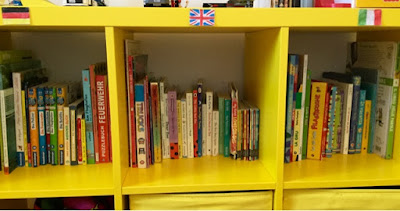Growing up with three languages part 2
I have recently read some interesting articles and studies about bilinguals, but I have found very little on trilinguals.
When I was a child and teenager (back in the 80's and 90's) being bilingual was not that common. I remember being on a school trip and phoning home from a telephone box, with my Italian class mates listening in fascination as I spoke English to my Mum. What was normal to me was special for most of them.
These days being bilingual is not such a big deal, but being trilingual still is.
I know a few children being raised with three languages and my son is one of them. As with most parenting issues, I tend to ignore the advice I don't agree with and follow my own instincts. In this case my instinct told me that we should try to raise little one with three languages right from birth.
His first words were a mixture of German, Italian and English and by a very early age he could already distinguish between the three languages. When he was two years old and started constructing actual sentences, there was a prevalence of German, which is the language of the country we live in. But whenever we spent some time in Italy or England, his vocabulary would suddenly expand and he would become more confident in the other two languages.
By the age of three, Leo's Italian was at the same level as his German (especially after spending several weeks in Italy over the summer holidays), but his English mainly consisted of simple "yes" and "no" answers and some basic words.
During the past year, he has often surprised us with his growing understanding of English sentences. Before he turned four he could follow most of what we were saying in English and watch Peppa Pig or Thomas the Tank Engine in English without any problems. Then around his fourth birthday and after spending time in Italy with his Italian and English family, we had a breakthrough: little one suddenly started speaking English, constructing full sentence and using different tenses.
"That was amazing!"
"We are going to the airport."
"The bridge collapsed."
"When Henry arrived, Thomas left."
"Thank you for flying Lufthansa, on time!"
Now not only does he speak English, but he can switch from English to German and/or Italian and back without any trouble.
He knows exactly which language to use depending on the country, the person, the book or the character of the story. For example, if he is playing with Thomas the Tank Engine, then he only speaks English. If he is a pilot talking to the manager at Frankfurt airport, he speaks German. If he has to explain something to me he switches to Italian.
Sometimes he mixes words from different languages or he adds "en" to an Italian word to make the German equivalent or "o" to an English word to make the Italian equivalent.
For example: "Der bridge ist schon damaged" -->German & English
"In dieser Direzionen" ("direzionen" from the Italian direzione) -->German
"Ora metto il Deckel e poi squeezo il dentrificio" ("squeezo" from the English squeeze) --> Italian and German
As with "squeezo", the results are often hilarious.





